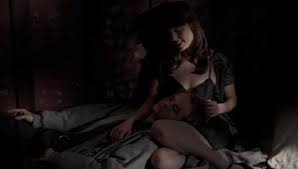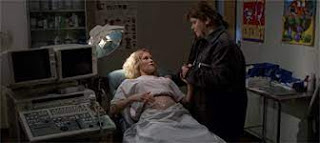Written and Directed by Darin Morgan
Air Date: May 1, 1998
Guest Stars: Bill Macy (Blurk); Dick Bakalyan (Abum); Alex Diakun (Greb); Wally Dalton (Toby)
A sharp turn into satire for Millennium, Darin Morgan's "Somehow, Satan Got Behind Me" features four demons in a donut shop contemplating humanity and the banality of evil. Full of '90s social commentary aimed at pop culture, the topical references are very 1998. The makeup staff went above and beyond.
As agents of chaos and pain for centuries the demons have become bored with humanity. Blurk relates a darkly comic tale of converting a disturbed young man who's obsessed with true crime books and serial killer memorabilia to start acting out his fantasies. In the podcast age true crime has gone mainstream in a big way as a popular entertainment, so maybe we have grown sicker . . .
The second tale related by Abum contends life in the late 20th century has become so joyless and predictable, people have become numb to the pleasures of sin. Perhaps the satire could've been amped up here, but it's in line Millennial unease about contemporary life everywhere in pop culture then and now.
Then Gren relates a more meta story that's a send up of Fox TV shows, specifically the network censors. Morgan drew on his own experiences writing for The X-Files. Mulder and Scully appear, Alien Autopsy and - remember the dancing baby (demon here) are among the many topical references. Are network censors a thing of the past?
The final section with Toby attempted to achieve a pathos, as he relates his attempt to fall in love and the sad failure that followed. Frank makes occasional appearances throughout as one of the few humans aware of their presence and asks them at the end, "Aren't you lonely."
In the 25 years since Millennium has aired one can only speculate how it would handle many of the themes it raised in the context of mass shooting and social media. What would Frank Black make of 2023?






